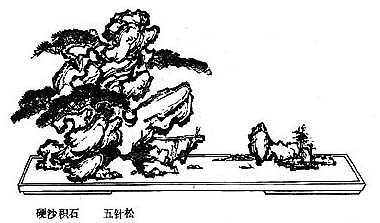詩
經
Shi Jing 
 – The Book of Odes
– The Book of Odes
The oldest collection of Chinese poetry, more than three hundred songs, odes and hymns. Tr. Legge (en) and Granet (fr, incomplete).
Shijing II. 2. (170)
The fish pass into the basket,
Yellow-jaws and sand-blowers.
Our host has spirits,
Good and abundance of them.
The fish pass into the basket,
Bream and tench.
Our host has spirits,
Abundance of them and good.
The fish pass into the basket,
Mud-fish and carp.
Our host has spirits,
Good and in quantities.
The viands are abundant,
And they are admirable.
The viands are excellent,
Both from the land and the sea.
The viands are in quantities,
And all in season.
Legge 170
Shijing II. 2. (171)
In the south is the barbel,
And, in multitudes, they are taken under baskets.
The host has spirits,
On which his admirable quests feast with him joyfully.
In the south is the barbel,
And, in multitudes, they are taken with wicker nets.
The host has spirits,
On which his admirable quests feast with him, delighted.
In the south are trees with curved drooping branches,
And the sweet gourds cling to them.
The host has spirits,
On which his admirable quests feast with him cheerfully.
The Filial doves keep flying about,
Coming in multitudes.
The host has spirits,
On which his admirable quests feast with him again and again.
Legge 171
Shijing II. 2. (172)
On the hills of the south is the Tai plant,
On those of the north is the Lai.
To be rejoiced in are ye, noble men,
The foundations of the State.
To be rejoiced in are ye, noble men ; –
May your years be myriads and without end !
On the hills of the south are the mulberry trees,
On those of the north are willows.
To be rejoiced in are ye, noble men,
The light of the State.
To be rejoiced in are ye, noble men ; –
May your years be myriads, unlimited !
On the hills of the south are medlars ;
On those of the north are plum trees.
To be rejoiced in are ye, noble men,
Parents of the people.
To be rejoiced in are ye, noble men ; –
May your virtuous fame have no end !
On the hills of the south is the Kao ;
On those of the north is the Niu.
To be rejoiced in are ye, noble men,
Have ye not the eyebrows of longevity ?
To be rejoiced in are ye, noble men ; –
May your virtuous fame be abundant !
On the hills of the south is the Ju ;
On those of the north is the Yu.
To be rejoiced in are ye, gentlemen ; –
Will ye not have the grey hair and wrinkled face ?
To be rejoiced in are ye, gentlemen ; –
May ye preserve and maintain your posterity !
Legge 172
Shijing II. 2. (173)
How long grows the southernwood,
With the dew lying on it so bright !
Now that I see my noble men,
My heart is entirely satisfied.
As we feast, we laugh and talk ; –
It is right they should have fame and prosperity !
How long grows the southernwood,
With the dew lying on it so abundantly !
Now that I see my noble men,
I appreciate their favour and their brightness.
Their virtue is without taint of error ; –
May they live long, and not be forgotten !
How high is the southernwood,
All wet with the fallen dew !
Now that I see my noble men,
Grandly we feast, delighted and complacent.
May their relations with their brothers be right !
May they be happy in their excellent virtue to old age !
How high is the southernwood,
With the dew lying on it so richly !
I have seen my noble men,
With the ends of their reins hanging down,
With the bells tinkling on their cross-boards and bits.
May all happiness gather upon them.
Legge 173
Shijing II. 2. (174)
Heavy lies the dew ;
Nothing but the sun can dry it.
Happily and long into the night we drink ; –
Till all are drunk, there is no retiring.
Heavy lies the dew ;
On that luxuriant grass.
Happily and long into the night we drin.
In the honoured apartment we complete our carousal.
Heavy lies the dew ;
On those willows and jujube trees.
Distinguished and true are my noble quests, –
Every one of excellent virtue.
From the Tong and the Yi,
Their fruit hangs down.
Happy and self-possessed are my noble quests, –
Every one of them of excellent deportment.
Legge 174

The Book of Odes – Shi Jing II. 2. – Chinese on/off – Français/English
Alias Shijing, Shi Jing, Book of Odes, Book of Songs, Classic of Odes, Classic of
Poetry, Livre des Odes, Canon des Poèmes.
The Book of Odes, The Analects, Great Learning, Doctrine of the Mean, Three-characters book, The Book of Changes, The Way and its Power, 300 Tang Poems, The Art of War, Thirty-Six Strategies
Welcome, help, notes, introduction, table.
Index – Contact – Top
